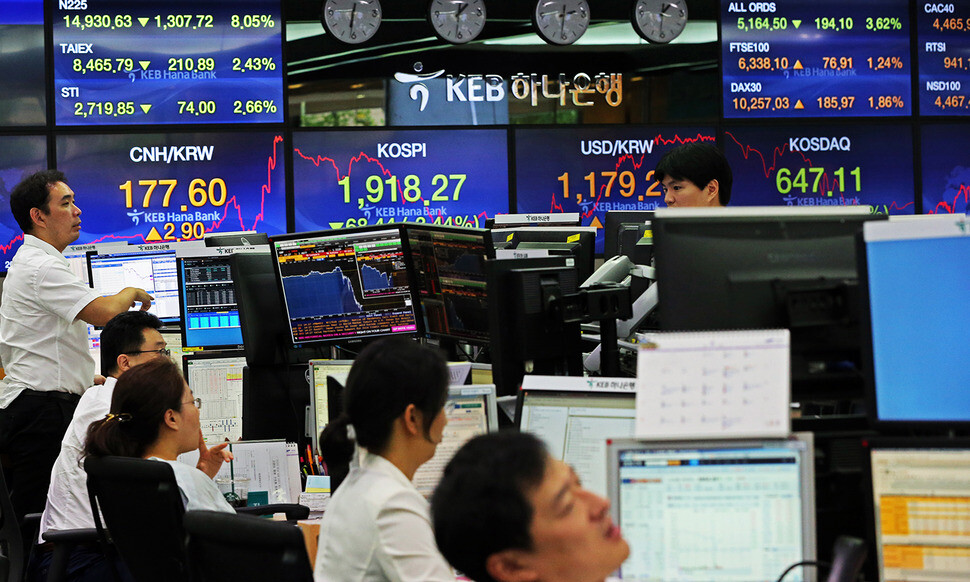hankyoreh
Links to other country sites 다른 나라 사이트 링크
Brexit means South Korean exporters could lose advantages they had with UK

With a majority of UK voters deciding to leave the EU on June 24, there is an increasing likelihood that South Korean industry, which is already dealing with sluggish exports, will suffer an even greater blow. But analysts say that the negative effect is unlikely to spread in the short term, since there is a two-year period before the UK actually leaves the EU. But if South Korea fails to reach a new trade agreement with the UK even after this period is over, South Korean exports that had enjoyed preferential tariffs and other advantages thanks to the EU-South Korea Free Trade Agreement are expected to lose some of their price competitiveness.
As a result of this decision, the UK can no longer take advantage of the trade and investment agreements that it made as a member of the EU. During the two-year period before the UK actually leaves the EU, South Korea will have to renegotiate economic relations with the UK along with the FTA that it signed with the EU. During this period, the current common market system in the EU will be maintained and the FTA will also stay in effect.
South Korea is expected to renegotiate its FTA with the EU to account for the UK’s departure, and it will also negotiate a new FTA with the UK.
“While negotiations are underway about the UK’s departure from the EU, we will need to hasten to make a new FTA with the UK and to completely rethink our economic cooperation strategy, including our export strategy to the EU and to the UK,” the Korea International Trade Association said in a statement on Friday.
South Korea recorded US$13.52 billion of trade with the UK last year, the highest amount ever. It had a US$1.26 billion trade surplus with the UK.
While South Korea’s exports are not heavily dependent on the UK – which receives 1.4% of South Korea’s total exports – the ramifications of Brexit should not be underestimated. If the UK sets an independent course as it parts ways from the EU, it cannot prevent trade from contracting. And a shrinking trade volume will have a negative effect on South Korea’s economy as well.
Private sector research institutes think it is very likely that South Korea’s trade volume with the UK after Brexit will fall below US$10 billion, the figure before South Korea reached the FTA with the EU.
A recent report by the LG Economic Research Institute predicts that South Korea and the UK’s trade volume will decrease over the mid- and long-term after Brexit.
While the business world believes that the direct effect of the UK’s departure from the EU will be limited, it regards the increasing uncertainty in the global economy as the greatest negative consequence.
“We don’t have a high trade volume with the Eurozone in the real economy. There are concerns, however, that if this creates problems for preserving the EU system in the long term, it could trigger uncertainty and a contraction in the global economy. That could have a major impact on the South Korean economy,” said Song Won-geun, chief economist for the Federation of Korean Industries.
By Hong Dae-seon, staff reporter
Please direct questions or comments to [english@hani.co.kr]

Editorial・opinion
![[Column] Season 2 of special prosecutor probe may be coming to Korea soon [Column] Season 2 of special prosecutor probe may be coming to Korea soon](https://flexible.img.hani.co.kr/flexible/normal/500/300/imgdb/original/2024/0426/3317141030699447.jpg) [Column] Season 2 of special prosecutor probe may be coming to Korea soon
[Column] Season 2 of special prosecutor probe may be coming to Korea soon![[Column] Park Geun-hye déjà vu in Yoon Suk-yeol [Column] Park Geun-hye déjà vu in Yoon Suk-yeol](https://flexible.img.hani.co.kr/flexible/normal/500/300/imgdb/original/2024/0424/651713945113788.jpg) [Column] Park Geun-hye déjà vu in Yoon Suk-yeol
[Column] Park Geun-hye déjà vu in Yoon Suk-yeol- [Editorial] New weight of N. Korea’s nuclear threats makes dialogue all the more urgent
- [Guest essay] The real reason Korea’s new right wants to dub Rhee a founding father
- [Column] ‘Choson’: Is it time we start referring to N. Korea in its own terms?
- [Editorial] Japan’s rewriting of history with Korea has gone too far
- [Column] The president’s questionable capacity for dialogue
- [Column] Are chaebol firms just pizza pies for families to divvy up as they please?
- [Column] Has Korea, too, crossed the Rubicon on China?
- [Correspondent’s column] In Japan’s alliance with US, echoes of its past alliances with UK
Most viewed articles
- 1[Column] Season 2 of special prosecutor probe may be coming to Korea soon
- 2‘We must say no’: Seoul defense chief on Korean, USFK involvement in hypothetical Taiwan crisis
- 3Is N. Korea threatening to test nukes in response to possible new US-led sanctions body?
- 4Division commander ordered troops to enter raging flood waters before Marine died, survivor says
- 5Amnesty notes ‘erosion’ of freedom of expression in Korea in annual human rights report
- 6Is Japan about to snatch control of Line messenger from Korea’s Naver?
- 7No good, very bad game for Korea puts it out of Olympics for first time since 1988
- 8[Editorial] Korea’s surprise Q1 growth requires objective assessment, not blind fanfare
- 9N. Korean delegation’s trip to Iran shows how Pyongyang is leveraging ties with Moscow
- 10Korea’s 1.3% growth in Q1 signals ‘textbook’ return to growth, says government